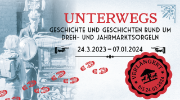Special exhibition from 24.03.2023 to 24.03.2024 at the Seewen Museum of Music Automatons.

On streets and squares, the tunes from barrel and fairground organs entice passers-by. The special exhibition ‘On the road' follows their sounds and gives us an insight into life and society at fairgrounds and in courtyards.
There is some uncertainty surrounding the origin of the barrel organ. The first written and visual evidence dates back to the early 18th century. At this time the mobile barrel organ was a popular instrument of travelling performers, such as wandering minstrels, who would tell spine-chilling stories and tales of adventure to entertain crowds in the countryside and in villages. Meanwhile, a familiar sight in towns and cities were organ grinders – who were nearly always men – wandering through the narrow streets with their instruments and playing them in courtyards to eke out a meagre living. The barrel organ made its stage debut in 1928 in the first performance of Bertolt Brecht's 'Threepenny Opera'.
The self-playing fairground organs also served to entice and entertain audiences with popular music and well-known hits. Until the 1930s, the fairground organ was the main source of music at funfairs besides the barrel organ and therefore a valuable piece of equipment for fairground entertainers. With its powerful sound and robust design, the fairground organ is specially designed for use in the open air. Together with attractions such as the merry-go-round and the swing boat, it travelled from place to place with the fairground entertainers.
Every barrel and fairground organ also has its own unique story to tell as before becoming exhibits in the collection of the Museum of Music Automatons and other museums and collections, these instruments had a life on the road. This special exhibition tells their stories and provides an insight into what they can tell us about these periods in history.
Showpeople and the fairground
From the perspective of showwoman and museum owner Cornelia Müller-Baer
At the fairgroundt
Pieces of music from various fairground organs
«Im D-Zug», Galopp
Komponist Franz von Blon
Arrangeur Gustav Bruder
SYMPHONIE-ORCHESTER-ORGEL
«Potpourri nach Angabe» für Schausteller Wyssenbach (Auszug)
Komponisten Franz von Suppé, Franz Schubert
Arrangeur Gustav Bruder
SYMPHONIE-ORCHESTER-ORGEL
«Chanson Gitane»
Komponist L. Poterat
Arrangeur unbekannt
ORCHESTROPHONE
«Sous le ciel de Paris»
Komponist Hubert Giraud
Arrangeur Tom Meijer
ORCHESTROPHONE
In the backstreets
Pieces of music from various barrel organs
«Die Moritat von Mackie Messer»
Komponist und Arrangeur Kurt Weill
Auf Stiftwalzen gesetzt von Giovanni Bacigalupo
MORITATENORGEL FLÛTE
«Der Morgenchoral des Peachum»
Komponist und Arrangeur Kurt Weill
Auf Stiftwalzen gesetzt von Giovanni Bacigalupo
MORITATENORGEL FLÛTE
«Kanonensong»
Komponist und Arrangeur Kurt Weill
Auf Stiftwalzen gesetzt von Giovanni Bacigalupo
MORITATENORGEL FLÛTE
«Salomonsong»
Komponist und Arrangeur Kurt Weill
Auf Stiftwalzen gesetzt von Giovanni Bacigalupo
MORITATENORGEL FLÛTE
«Das Lied von der Unzulänglichkeit menschlichen Strebens»
Komponist und Arrangeur Kurt Weill
Auf Stiftwalzen gesetzt von Giovanni Bacigalupo
MORITATENORGEL FLÛTE
«Es sprach der weise Marabu»
Komponist A. Egen und F.Germann
Arrangeur Louis Reusch
VIOLINO-CLARITON
«Es war in Schöneberg, im Monat Mai»
Komponist Walter Kollo
Arrangeur Gebr. Reusch
VIOLINOPAN No. 21
«In Rixdorf ist Musike»
Komponist E. Philippi
Arrangeur Gebr. Reusch
VIOLINOPAN No. 21
«Que Serà»
Komponist Jay Livingston / Ray Evans
Arrangeur Max-Alfred Geweke
TROMPETEN-ORGEL
«Ich weiss was dir fehlt»
Komponist Heino Gaze, Heinz Gietz
Arrangeur Max-Alfred Geweke
TROMPETEN-ORGEL
«Pigalle, Pigalle»
Komponist Heinz Gietz
Arrangeur Max-Alfred Geweke
VIOLINOPAN

